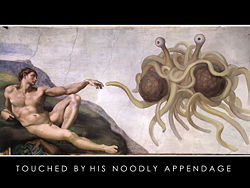Atheism is simply the disbelief in the existence of God or gods. It was Richard Dawkins who said, "We are all atheists about most of the gods that humanity has ever believed in. Some of us just go one god further".
I would think that most atheists would also be highly skeptical about all superstitions, the paranormal, the existence of ghosts, the supernatural, divination and so-called alternative medicine (that is, non-evidence-based medicine).
| |
The full Bertrand Russell quote from which I took a part in the heading
"I wish to propose for the reader's favourable consideration a doctrine which may, I fear, appear wildly paradoxical and subversive. The doctrine in question is this: that it is undesirable to believe a proposition when there is no ground whatever for supposing it true. I must, of course, admit that if such an opinion became common it would completely transform our social life and our political system; since both are at present faultless, this must weigh against it."
Skeptical Essays, I (1928)Skeptical Essays, I (1928)
|
|
|
|
|
- "We are all atheists about most of the gods that humanity has ever believed in. Some of us just go one god further."
- Richard Dawkins on Militant Atheism, 2002
- "What can be asserted without evidence can also be dismissed without evidence."
- Christopher Hitchens, Hitchins's Razor
| |
- Atheism is rational above all, religion is irrational;
- Atheism encourages us to believe only those things that are supported by sound evidence;
- Atheists need have no fear of death;
- There are no limitations on free thought in atheism;
- Atheism comes without the delusions that are inherent in religion;
- Atheism is antipathetic to delusion;
- An atheist is bound by ethical standards, not out of date, foolish and often unethical religious strictures;
- Atheism forces its adherents to think, they can’t just unthinkingly follow rules in some ancient book;
- Religious scientists who adopt atheism can de-compartmentalise their minds;
- Without religious hang-ups we can open our minds about death and dying.
These points are expanded upon below...
Atheism and rationality
Throwing out the delusions of religion forces us to think for ourselves and to question any beliefs that we may have that are not supported by sound evidence; in short, it encourages us to think rationally.
Belief and evidence
Atheism is the greatest step that any religious person can take toward dispensing with all beliefs that are not supported by evidence. The adoption of atheism is a major step toward clear thinking.
| |

|
The Flying Spaghetti Monster is just as valid a god as any other.
Similarly, Bertrand Russell proposed a china teapot in solar orbit between Earth and Mars; just as impossible to prove or disprove at the time as was the existence of God.
| |
Why an atheist has no need to fear death
To an atheist nothing comes after death, no judgement, no purgatory, no reincarnation, no heaven or hell.
Death, to an atheist is like going to sleep, but it's a sleep from which there is no awakening. Very few of us have any fear of going to sleep.
Free thought
An atheist doesn't have his or her thoughts constrained by rules that were written long ago by people who we know nothing about.
No religious delusions
An atheist doesn't have delusional beliefs such as the logically insupportable idea of an
immortal soul. The greatest delusion that comes with religion is the belief in supernatural beings; non-belief in gods, spirits, angels, demons and devils is a fundamental of atheism.
Atheism is antipathetic to delusion
Of course atheism does not guarantee that there will be no
delusions, we all should examine our beliefs to make sure that they are all reasonable, I have written
elsewhere of the importance of doubt. But atheism itself moves people away from delusion and toward
rational thought.
| |
Faith – the greatest enemy of reason
|
|---|

| How very true John. It could equally well be said that faith – the holding of beliefs without supporting evidence, or even contrary to the evidence – is the greatest enemy of reason.
| |
Atheists are free to develop ethical standards
Since atheists don't have the, largely outdated and often seriously flawed, morality that would come from a literal reading of holy books they develop ethical standards based on sensible thought processes.
(I've written
elsewhere about the very unethical acts and rules written in the Bible. No intelligent, open minded person, could believe that anyone, including the religious, gets their ethical standards from the Bible.)
Atheists have to think for themselves
Not having stories about how the world came to be, how humans were 'created', how commandments were carved in stone by God, forces atheists to think for themselves about these things. Not having a limited set of 'moral laws' that were written thousands of years ago when society was very different from what it is today, frees the mind to consider how we should live in the modern world. Holy books say nothing about modern problems (think climate change, the refugee crisis, overpopulation, resource depletion, etcetera). Modern people have to find answers to these problems using clear, critical, free and rational ethical thinking.
Religious scientists who adopt atheism can de-compartmentalise their minds
Scientists who are religious have to think in one way: openly, rationally, critically - when working on science, and switch to thinking unquestioningly, dogmatically, when in religious mode.
Perhaps surprisingly, 'compartmentalise their minds' in this way does does not seem to cripple them in the practice of science. Some great scientists, including Einstein, were, at least to some extent, religious.
The ability of some scientists to compartmentalise their minds in this way has long intrigued me; it seems to be one of the strange quirks of humans. Perhaps some day other scientists will explain how it works.
Opening our minds about death
If we dump erroneous religious beliefs about life being a god-given gift we can think freely and rationally about
death and
assisted dying. We don't allow our domestic
animals do die long, slow, painful deaths. Religion has been the greatest impediment to providing the same humane consideration to our fellow humans.

